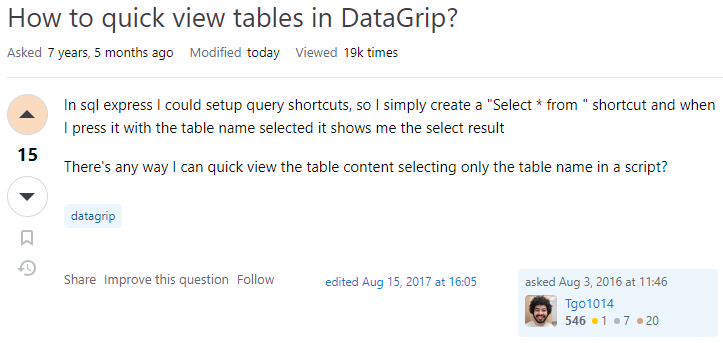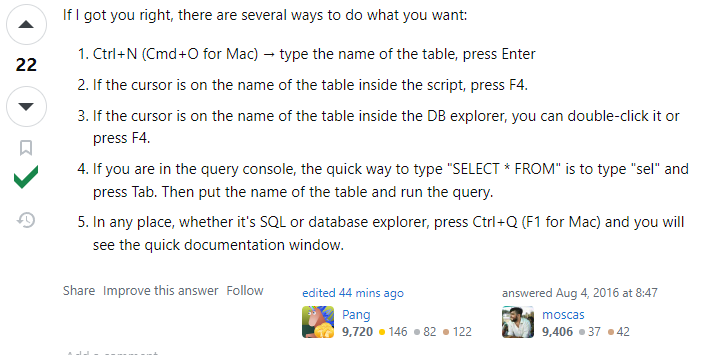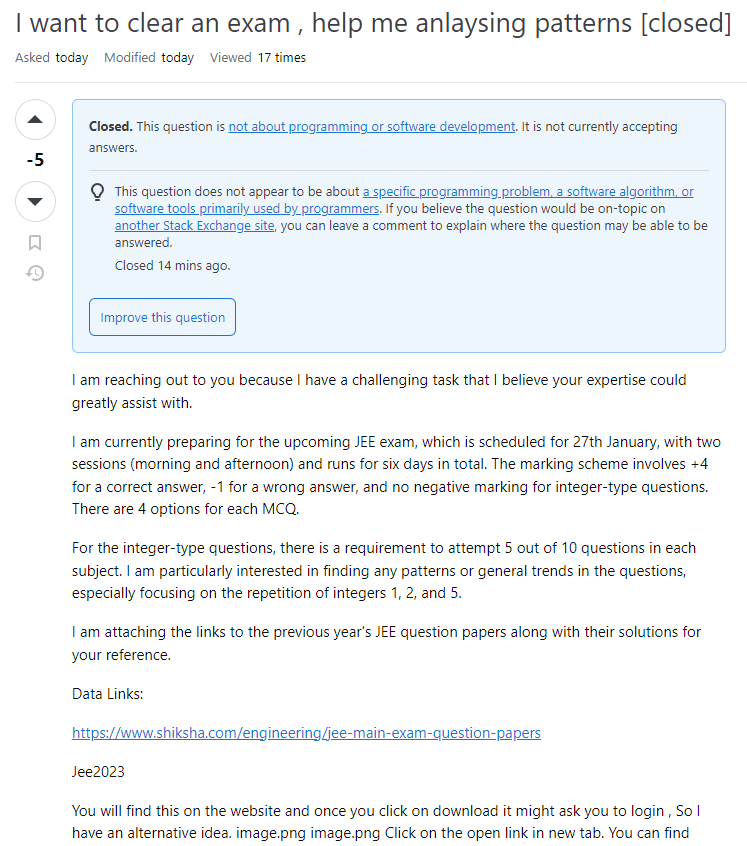Asking Smart Questions
24 Jan 2024Smart Questions in Software Engineering: A StackOverflow Analysis
Introduction
Effective communication is paramount in software engineering, and asking questions in a smart way plays a pivotal role in fostering collaboration and problem-solving. In this essay, we explore examples from StackOverflow to understand the positive outcomes of smart questions and the challenges associated with questions that don’t adhere to established guidelines.
Section 1: Smart Question Example
Question Title: How to quick view tables in DataGrip?

In accordance with Eric Raymond’s principles, the question demonstrates several positive aspects:
- Clarity: The user’s question is clear and concise, describing a specific problem related to viewing tables in DataGrip.
- Context: The user provides context by mentioning their experience with SQL Express and their specific requirement for quick viewing table content.
- Detail: While concise, the user includes enough details about their requirements to convey the issue effectively.
Eric Raymond’s Principle: “Be clear, concise, and contextually rich in your question.”
Section 2: Smart Question Responses
Examining the responses to the smart question, we observe how they align with the benefits of asking questions in a smart way, as per Eric Raymond’s principles:
Answer 1 (moscas’s answer):

Positive Aspects:
- Comprehensive Solutions: The answer provides multiple solutions to the user’s problem, covering various scenarios and preferences.
- Clarity: Each solution is explained clearly, making it easy for the user to understand and implement.
Eric Raymond’s Principle: “Be gentle. Problem-related stress can make people seem rude or stupid even when they’re not.”
Answer 2 (mucio’s answer):

Positive Aspects:
- Quick Solution: The answer suggests a quick solution to the problem, addressing the user’s need for faster results.
- Clarity: The solution is presented clearly and concisely.
Eric Raymond’s Principle: “Be gentle. Problem-related stress can make people seem rude or stupid even when they’re not.”
Answer 3 (Ramin Melikov’s answer):

Positive Aspects:
- Direct Solution: The answer provides a straightforward solution to the user’s question.
Eric Raymond’s Principle: “Answer the actual question! If the querent has been so thorough as to do his or her research…”
Overall Assessment:
The community’s engagement and the quality of responses reflect the collaborative and informative nature of the platform, aligning with Eric Raymond’s principles for effective communication within the open-source community.
Section 3: Not So Smart Question Example
Question Title: I want to clear an exam , help me anlaysing patterns

Summary: The question revolves around the user’s preparation for the JEE exam and their request for assistance in analyzing patterns and probabilities in previous year question papers. However, the question lacks specificity, providing vague criteria for analysis and making an overwhelming request for multiple aspects.
Analysis:
- Vague and Broad Request: The user’s question is broad and lacks specific details about the desired patterns or trends, making it challenging for potential responders to provide targeted assistance.
- Limited Context: While the user mentions a desire to analyze questions based on probability and identify patterns, the specific aspects or characteristics they are interested in are not clearly defined.
- Complex Request: The question requests analysis on various aspects, such as identifying the likelihood of integers 1, 2, or 5, observing patterns in options, and seeking techniques for eliminating options. This complexity may discourage potential responders.
Eric Raymond’s Principle: “If you can’t get an answer, please don’t take it personally that we don’t feel we can help you. Sometimes the members of the asked group may simply not know the answer.”
Why It Deviates: The question deviates from smart questioning principles by being vague, lacking clarity on specific requirements, and presenting a complex and overwhelming request.
Section 4: Not So Smart Question Responses
Evaluation: The question received no responses, indicating a lack of engagement from the community. The absence of adherence to smart questioning principles, such as clarity and specificity, may have influenced the quality of help received. Potential challenges in the interaction include:
- Lack of Clarity: The question’s vague nature might have deterred potential responders who could not discern the user’s specific needs.
- Complex Request: The overwhelming request for analyzing various aspects may have discouraged community members from investing time in providing a comprehensive response.
- Limited Expertise: The specialized nature of the JEE exam and the need for expertise in probability analysis may have limited the pool of community members confident in addressing the user’s requirements.
In summary, the not-so-smart question’s lack of clarity, complexity, and specialized nature may have contributed to its receiving no responses.
Section 5: Insights and Reflection
Insights:
- Smart questions, aligned with Raymond’s principles, tend to receive comprehensive and efficient responses from the community.
- Lack of clarity, complex requests, and bad grammar in questions may lead to a dearth of responses, limiting the effectiveness of community engagement.
Conclusion
As software engineers, the ability to pose smart questions is paramount in fostering productive interactions within the developer community. Raymond’s principles provide a valuable framework for effective communication, ensuring that questions are clear, detailed, and presented with respect. The contrast between smart and not-so-smart questions on StackOverflow highlights the tangible impact of question quality on the quality of responses and community engagement. By internalizing these principles, software engineers can enhance their communication skills and contribute to a collaborative and supportive developer ecosystem.